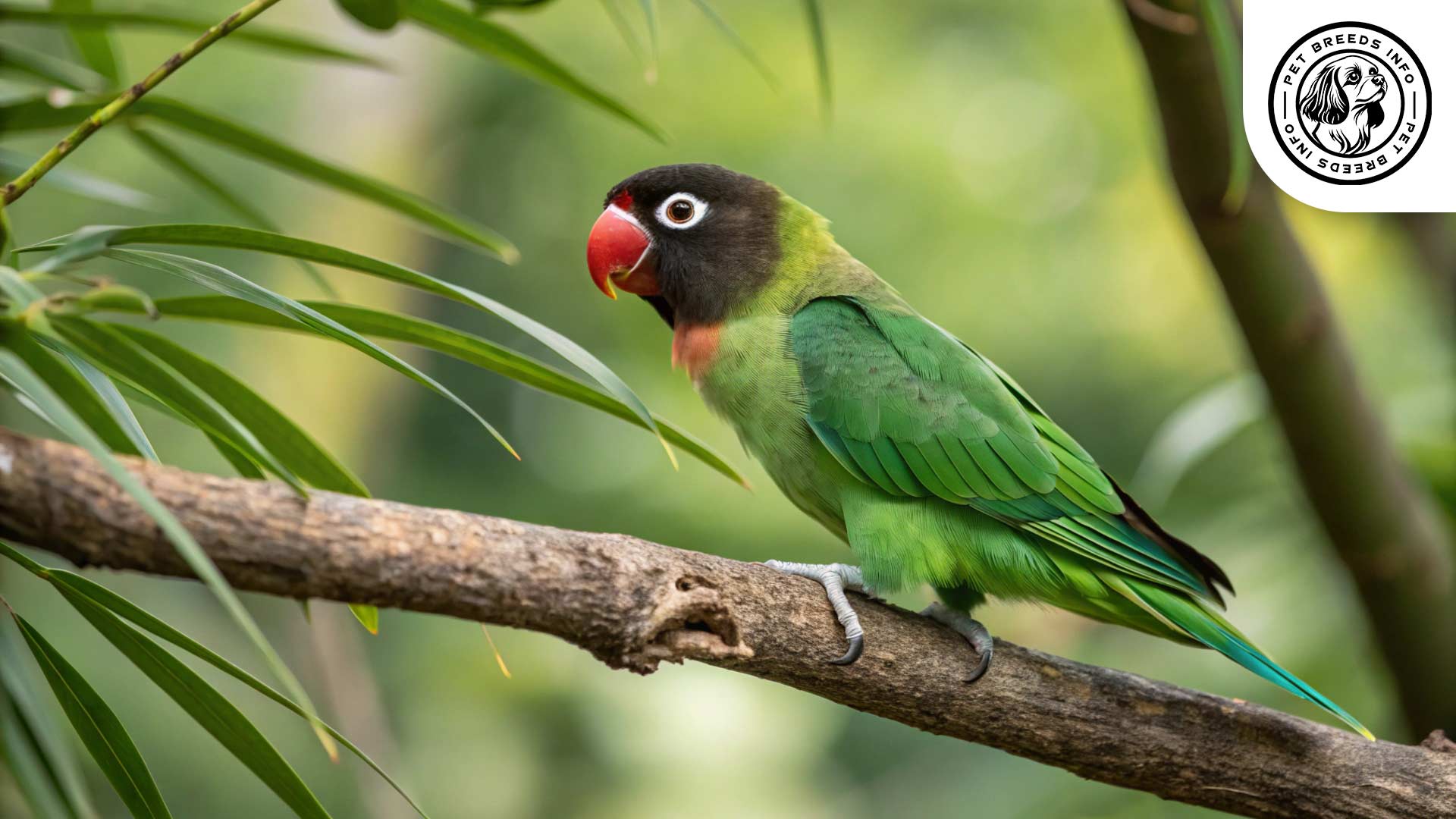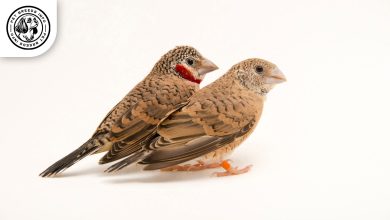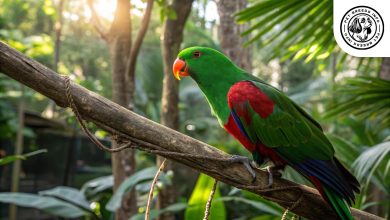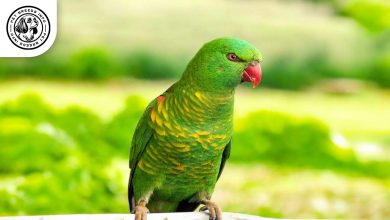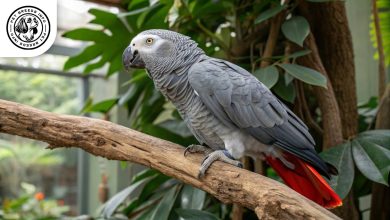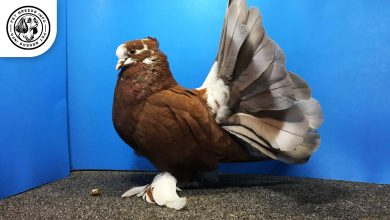Black-cheeked Lovebird : Personality, Lifespan, Food & Care
General Introduction of the Breed
The Black-cheeked Lovebird (Agapornis nigrigenis) is a small, vibrant parrot species belonging to the lovebird family. Native to Zambia, this species is known for its affectionate nature and striking coloration. The breed was first described in the early 1900s and has since become a popular choice among avian enthusiasts. Due to habitat loss and trapping for the pet trade, wild populations have declined, making conservation efforts crucial.
Table of Contents
| Common Name: | Black-cheeked Lovebird |
| Scientific Name: | Agapornis nigrigenis |
| Origin: | Zambia |
| Size: | 13 to 14 cm (5 to 5.5 inches) |
| Lifespan: | 10 to 15 years |
| Talking Ability: | (Not explicitly mentioned, but lovebirds are generally not known for extensive talking abilities) |
| Colors: | Predominantly green plumage, darker tones on wings and back, black or dark brown cheeks and face, reddish-orange beak |
| Noise Level: | (Implied to be vocal and potentially loud due to their energetic and social nature, but not explicitly quantified) |
| Social Behavior: | Highly social, require companionship, form strong bonds with owners, can be territorial or aggressive if not properly socialized |
Physical Characteristics
The Black-cheeked Lovebird is one of the smallest lovebirds, measuring around 13 to 14 cm (5 to 5.5 inches) in length and weighing approximately 40 to 50 grams. It has a short, stocky body covered in predominantly green plumage, with darker tones on the wings and back. The most distinctive feature is its black or dark brown cheeks and face, which contrast sharply with the rest of its feathers.
The bird’s eyes are round and dark, giving it an expressive look. It has a short tail, and its beak is a bright reddish-orange color, adding to its appeal. This species does not exhibit significant sexual dimorphism, meaning males and females look almost identical.
Read More: Diamond Dove
Personality and Temperament
Black-cheeked Lovebirds are known for their intelligent and playful nature. They are highly social birds that require companionship, either from humans or other birds. Without enough interaction, they may become stressed or develop behavioral issues.
They are energetic and love engaging in activities like climbing, chewing, and exploring their environment. These birds form strong bonds with their owners, making them affectionate pets. However, they can also exhibit territorial or aggressive behaviors if not properly socialized. Their sensitivity to environmental changes means they thrive in stable, calm settings.
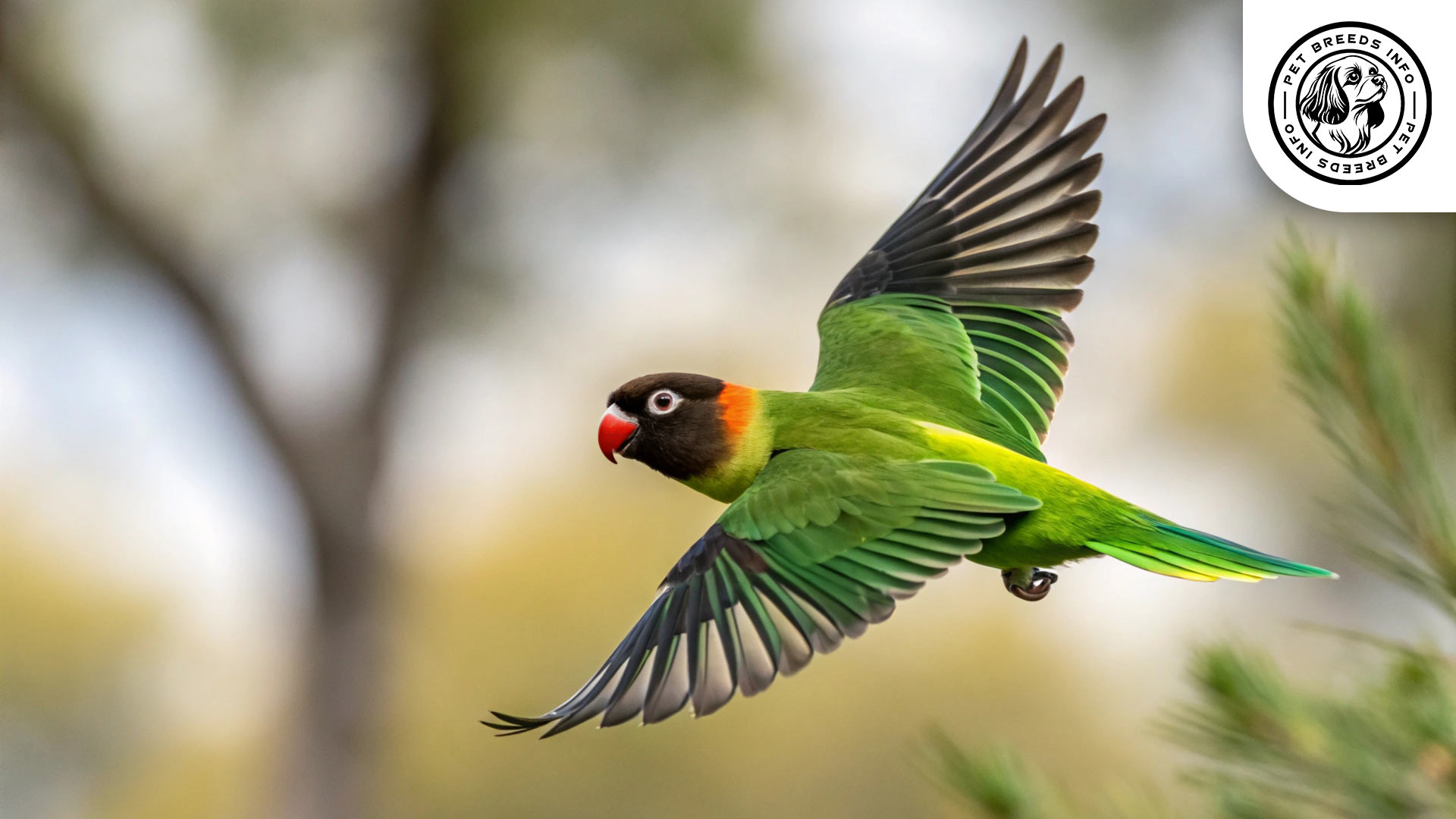
Care and Maintenance Requirements
These birds require a spacious cage or aviary where they have room to fly and explore. An enclosure with horizontal bars is ideal as it allows them to climb and exercise. Daily out-of-cage time is recommended to ensure their physical and mental well-being.
Grooming needs include occasional nail trimming, and bathing opportunities should be provided through shallow water dishes or misting. Their diet should be supplemented with fresh produce to maintain their overall health.
Black-cheeked Lovebirds are sensitive to extreme temperatures. Avoid placing their cage in overly hot or cold areas, as they thrive best in moderate climates.
Diet and Nutrition
The ideal diet for Black-cheeked Lovebirds consists of high-quality pellet food supplemented with fresh fruits and vegetables such as apples, carrots, spinach, and bell peppers. Seeds should only be given in moderation, as they can lead to obesity and nutritional imbalances.
Certain foods, such as chocolate, avocados, and caffeine, are toxic to lovebirds and must be avoided. Fresh, clean water should always be available. Portion sizes should be appropriate for their size, with food being refreshed daily.
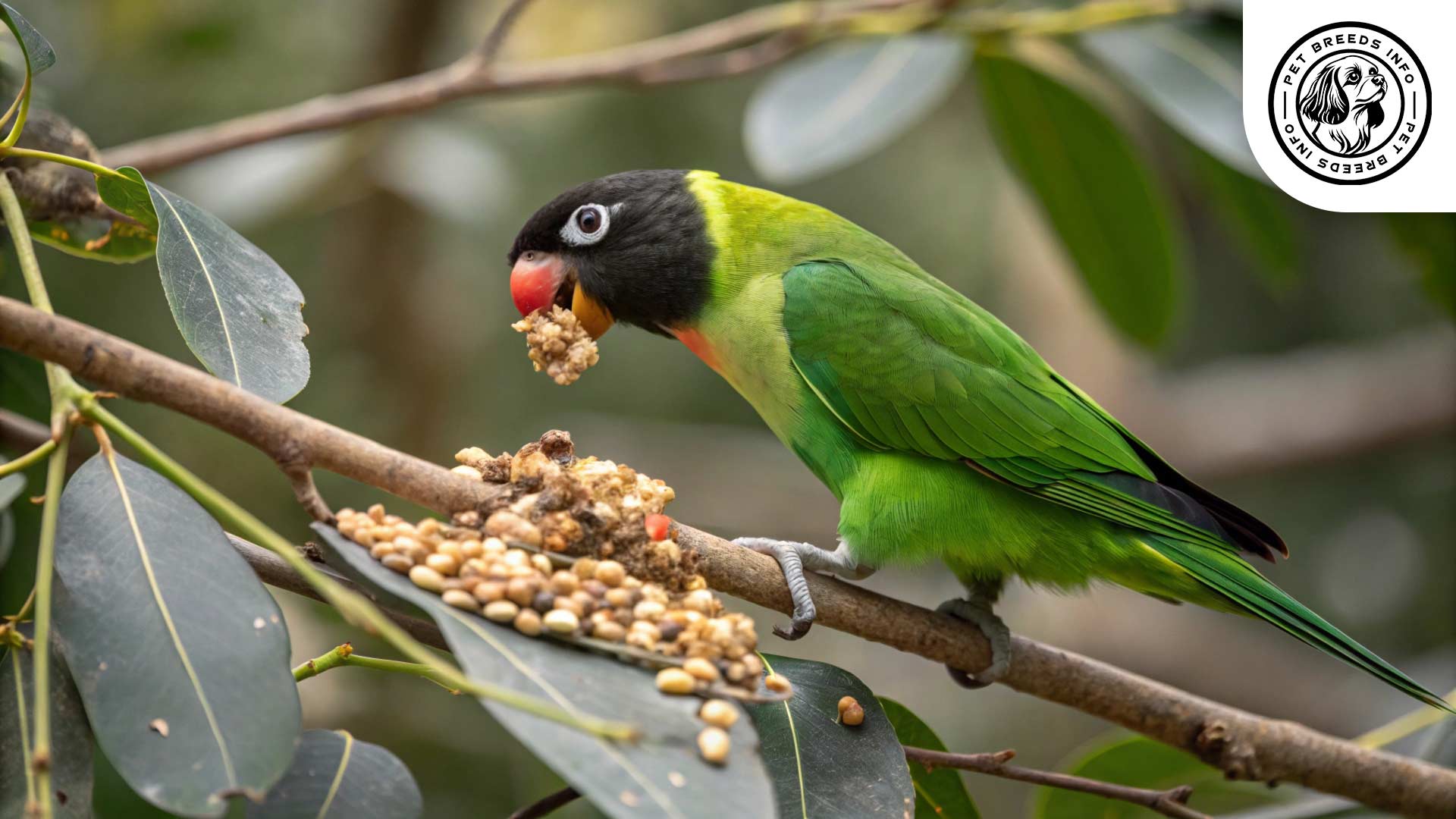
Health and Common Medical Issues
Black-cheeked Lovebirds are prone to common avian illnesses, including respiratory infections, psittacine beak and feather disease (PBFD), and mites. Ensuring a clean cage and a well-balanced diet can help prevent these issues.
They typically have a lifespan of 10 to 15 years, although proper care can extend their longevity. Regular veterinary check-ups and vaccinations are recommended to keep them healthy.
Read More: American Budgerigar Bird
Training and Behavior Management
Training Black-cheeked Lovebirds requires patience and positive reinforcement techniques. They can learn simple commands and tricks if trained consistently. Socialization from an early age helps reduce aggressive tendencies and promotes bonding.
Bird-safe toys and activities should be provided to keep them engaged. These birds respond well to interactions with their owners, so daily engagement is essential for their happiness.
Interaction with Other Animals and Humans
These lovebirds thrive in the company of their owners and other birds. If keeping multiple lovebirds, ensure they are introduced properly to avoid aggression. They may not get along well with larger or predatory pets, such as cats or dogs.
They are suitable for families and individuals alike, but young children should be taught how to handle them gently. While they can be independent, they also form strong emotional attachments with their owners.
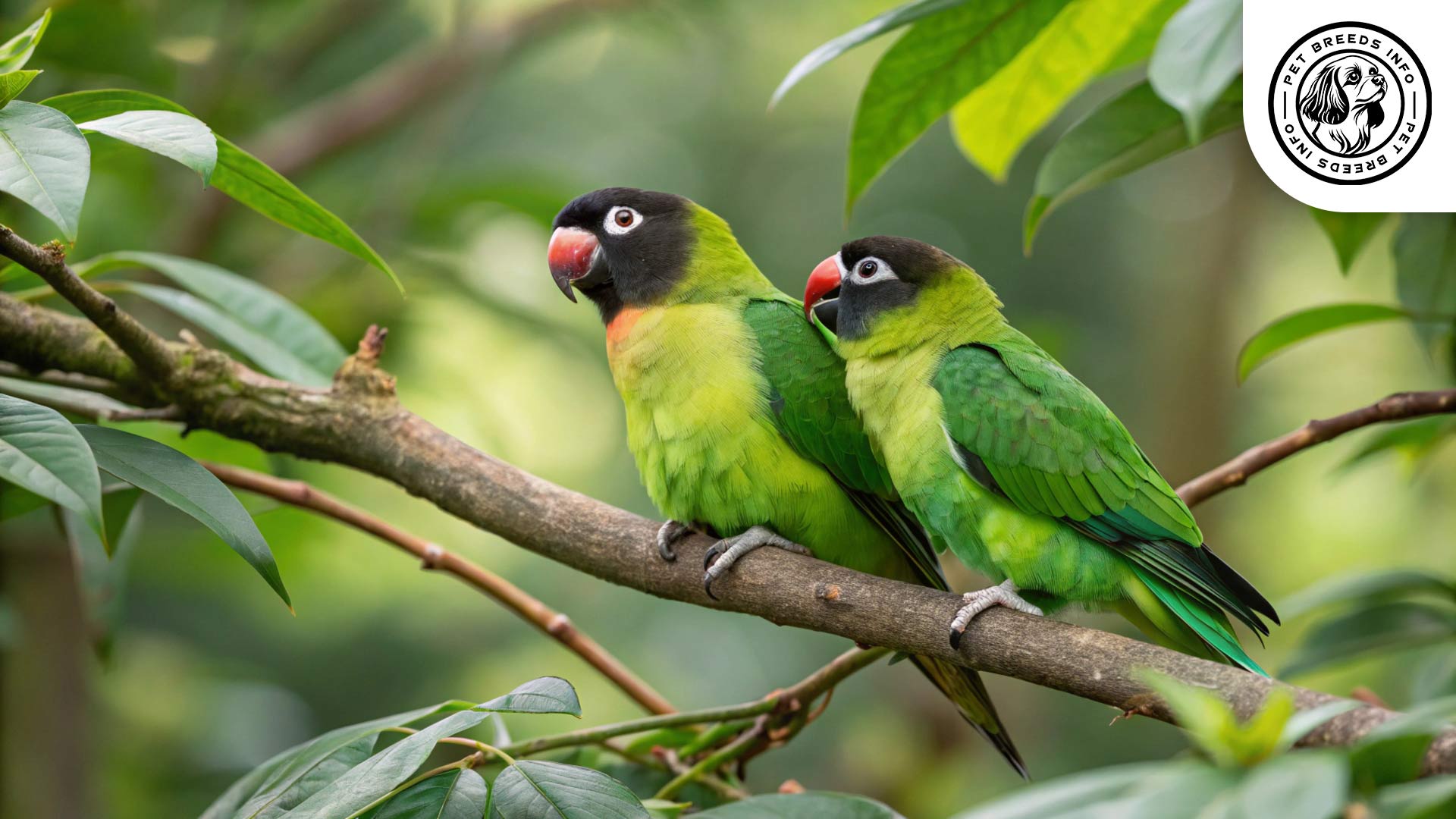
Price and Availability
Black-cheeked Lovebirds are relatively rare compared to other lovebird species, and their price can vary depending on availability and breeder reputation. On average, they can cost between $100 to $300 per bird.
Potential owners should ensure they purchase from reputable breeders or consider adoption from avian rescue organizations. Ethical breeding practices must be prioritized to promote the conservation of this species.
Read More: Ancona Chicken Bird
Conclusion and Final Thoughts
The Black-cheeked Lovebird is a wonderful pet for bird lovers seeking a social and affectionate companion. They require dedicated care, proper nutrition, and daily interaction to remain happy and healthy.
Ideal for those who can provide attention and companionship, these birds thrive best in stable environments. Before adopting or purchasing a Black-cheeked Lovebird, potential owners should consider their social needs, space requirements, and the responsibility of long-term care.
With proper care and a loving home, these beautiful birds can be delightful companions for many years.
FAQ
What is a Black-cheeked Lovebird known for?
They are known for their affectionate nature and striking black cheeks.
How big do Black-cheeked Lovebirds get?
They are small birds, typically measuring around 13 to 14 cm (5 to 5.5 inches) in length.
Do Black-cheeked Lovebirds need a lot of interaction?
Yes, they are highly social birds and require daily interaction with humans or other birds.
What should Black-cheeked Lovebirds eat?
Their diet should consist of high-quality pellets supplemented with fresh fruits and vegetables.
How long do Black-cheeked Lovebirds typically live?
With proper care, they can live for 10 to 15 years.
